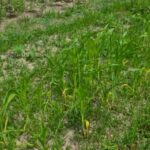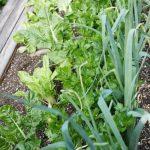Are you interested in learning more about vegetable gardening in Georgia? In this article, we will explore the expertise of Walter Reeves, known as the Georgia Gardener, and his tips for successful vegetable gardening in the state. From the best vegetables to plant, to common mistakes to avoid, to dealing with pests and diseases, Walter Reeves has valuable insight to share with Georgia gardeners.
Walter Reeves is a well-known gardening expert in Georgia, best known for his radio show “The Lawn and Garden Show” and his appearances on television. With decades of experience and a passion for gardening, he has become a trusted source of information for gardeners across the state. Whether you’re a beginner or an experienced gardener, Walter Reeves has plenty of wisdom to offer when it comes to getting the most out of your Georgia vegetable garden.
In this section, we’ll delve into the essentials of successful vegetable gardening in Georgia, drawing from Walter Reeves’ wealth of knowledge. From selecting the best vegetables for your garden to preparing your soil for planting, we’ll explore all aspects of creating a thriving vegetable garden in Georgia. Get ready to learn from one of the most respected voices in Southern gardening as we uncover the secrets to successful vegetable gardening in Georgia.
The Best Vegetables for Georgia Gardens
When it comes to vegetable gardening in Georgia, it’s important to choose the right vegetables that thrive in the state’s climate and soil conditions. Walter Reeves, also known as the “Georgia Gardener,” has extensive knowledge about which vegetables are best suited for Georgia gardens. Here are some of the top vegetables that Walter Reeves recommends for Georgia gardeners:
- Tomatoes: Varieties like Better Boy, Celebrity, and Roma are well-suited for Georgia’s warm climate and produce delicious fruits throughout the growing season.
- Okra: This heat-loving vegetable is a staple in Southern gardens and does exceptionally well in Georgia’s hot summers.
- Collard Greens: A favorite in Southern cuisine, collard greens thrive in Georgia’s climate and can be harvested from early spring to late fall.
- Pole Beans: Varieties such as Kentucky Wonder and Blue Lake are great choices for Georgia gardeners, producing high yields of flavorful beans.
In addition to these recommendations, Walter Reeves suggests that Georgia gardeners consider planting cucumbers, squash, peppers, and sweet potatoes in their vegetable gardens. These vegetables not only withstand Georgia’s weather conditions but also provide an abundant harvest for home cooks.
Ultimately, by choosing the right vegetables for your Georgia garden based on Walter Reeves’ advice, you can enjoy a bountiful harvest throughout the growing season. Remember to consider your specific growing zone within the state to determine which varieties will thrive best in your area.
Tips and Tricks From Walter Reeves for Successful Vegetable Gardening
Walter Reeves, also known as “The Georgia Gardener,” is a well-known expert in the field of vegetable gardening in Georgia. With his extensive knowledge and experience, he has become a trusted source of information for both novice and experienced gardeners alike. Here are some of Walter Reeves’ top tips and tricks for successful vegetable gardening in Georgia:
- Choose the right vegetables: When planning your Georgia vegetable garden, it’s essential to select the right vegetables that are suitable for the state’s climate and growing conditions. Some of the best vegetables to consider include tomatoes, peppers, cucumbers, squash, okra, and sweet potatoes.
- Proper soil preparation: Before planting your vegetables, it’s important to prepare the soil properly. Walter Reeves recommends testing the soil to determine its pH level and making any necessary adjustments to ensure optimal growing conditions for your plants.
- Plant at the right time: Timing is crucial when it comes to planting vegetables in Georgia. Walter Reeves advises following a planting calendar specific to the region to ensure that you plant at the appropriate times for each type of vegetable.
By following these tips from Walter Reeves, you can increase your chances of success and enjoy a bountiful harvest from your Georgia vegetable garden.
Walter Reeves has shared valuable insights into common mistakes that many gardeners make when growing vegetables in Georgia. By being aware of these mistakes, you can take proactive steps to avoid them and improve your chances of a successful harvest:
- Over or under-watering: Proper watering is crucial for the health of your plants. Pay attention to signs of over or under-watering and adjust your watering schedule accordingly.
- Poor pest management: Failure to address pests such as aphids, squash bugs, or tomato hornworms can lead to significant damage to your crops. Implement an effective pest management strategy recommended by Walter Reeves.
- Ignoring soil quality: Neglecting the condition of your soil can significantly impact the growth and yield of your vegetables. Follow Walter Reeves’ advice on improving soil quality through composting and organic amendments.
By avoiding these common mistakes with guidance from Walter Reeves, you can set yourself up for a successful vegetable garden in Georgia.
Common Vegetable Gardening Mistakes to Avoid
Planting at the Wrong Time
One common mistake that many Georgia gardeners make is planting their vegetables too early or too late. Walter Reeves, the well-known Georgia gardener, advises that it is important to know the specific planting times for each vegetable in your area. By following a planting calendar tailored to Georgia’s climate, you can ensure that your vegetables have the best chance of thriving.
Overcrowding Your Garden
Another mistake to avoid is overcrowding your garden with too many vegetables. When plants are cramped together, they compete for nutrients and sunlight, which can lead to stunted growth and increased susceptibility to pests and diseases. Walter Reeves recommends following proper spacing guidelines for each type of vegetable to maximize their growth potential.
Ignoring Soil Quality
Neglecting the quality of your soil is also a common mistake in vegetable gardening. It is essential to test your soil regularly and amend it as needed with organic matter, such as compost or aged manure. According to Walter Reeves, healthy soil is the foundation for a successful garden, providing essential nutrients and promoting strong root development in your vegetables.
By being mindful of these common mistakes and heeding the advice of experts like Walter Reeves, Georgia vegetable gardeners can set themselves up for a bountiful harvest and a thriving garden.
Steps to Prepare Your Garden for Planting
When it comes to preparing your Georgia garden for planting, Walter Reeves, also known as the Georgia Gardener, has some valuable advice to offer. One of the first steps to take is to test the soil in your garden.
A simple soil test can provide you with important information about the pH levels and nutrient content of your soil, allowing you to make any necessary amendments before planting. You can easily perform a soil test using a DIY kit or by sending a sample to a local agricultural extension service.
Another crucial step in preparing your garden for planting is to clear the area of any debris, weeds, and old plant material from previous seasons. This will help create a clean slate for your new crops and reduce competition for water and nutrients.
If you have a larger garden plot, consider using a tiller or a shovel to turn over the soil and break up any compacted areas. This will improve drainage and make it easier for your plants’ roots to penetrate the soil.
After clearing and tilling your garden, Walter Reeves recommends adding organic matter such as compost or well-rotted manure to enrich the soil. Organic matter improves soil structure, provides essential nutrients, and increases moisture retention – all of which are beneficial for healthy plant growth in Georgia’s climate. By following these preparatory steps, you’ll be well on your way to establishing a thriving vegetable garden that’s ready for planting.
| Preparation Steps | Details |
|---|---|
| Soil Testing | Test pH levels and nutrient content before planting. |
| Clearing the Area | Remove debris, weeds, and old plant material from previous seasons. |
| Adding Organic Matter | Enrich the soil with compost or well-rotted manure. |
Watering and Fertilizing Your Georgia Vegetable Garden
When it comes to successful vegetable gardening in Georgia, proper watering and fertilizing are essential for a bountiful harvest. Walter Reeves, the Georgia Gardener, has years of experience and expertise in this area, and he offers valuable tips for gardeners to ensure their vegetables thrive.
Watering Your Georgia Vegetable Garden
One of the key factors in maintaining a healthy vegetable garden is providing adequate water. In Georgia, where hot and dry summers are common, it’s important to establish a regular watering routine. Walter Reeves recommends watering deeply but infrequently to encourage strong root development. This means ensuring that the soil is thoroughly soaked when watering rather than providing small amounts of water more often.
In addition, it’s crucial to water the base of the plants rather than spraying water over the entire plant. This helps prevent foliage diseases and encourages the roots to grow deeper into the soil. Using mulch around your plants can help retain moisture and reduce the frequency of watering.
Fertilizing Your Georgia Vegetable Garden
Fertilizing your vegetable garden is another key aspect of successful gardening in Georgia. Before planting, it’s important to enrich the soil with organic matter such as compost or well-rotted manure. This will provide essential nutrients for your plants and improve soil structure.
Throughout the growing season, Walter Reeves suggests using a balanced fertilizer specifically formulated for vegetables. It’s essential to follow package instructions for application rates and timing to avoid over-fertilization, which can harm your plants. Additionally, incorporating organic fertilizers into your routine can help maintain long-term soil health and fertility.
By following these guidelines for watering and fertilizing from Walter Reeves, Georgia vegetable gardeners can ensure their plants receive the nutrients and moisture they need to thrive throughout the growing season.
Dealing With Pests and Diseases in Georgia Vegetable Gardens
Walter Reeves, also known as the “Georgia Gardener,” has extensive knowledge and experience in dealing with pests and diseases in Georgia vegetable gardens. In this section, we will explore some of his expert tips for keeping your garden healthy and thriving.
One of the most common pests in Georgia vegetable gardens is the tomato hornworm. These large green caterpillars can quickly devastate a tomato plant if not dealt with promptly. Walter Reeves recommends handpicking these pests off your plants as soon as you spot them, or introducing natural predators such as parasitic wasps to keep their population under control.
In addition to pests, Georgia gardeners also have to contend with a variety of diseases that can affect their vegetable crops. One common disease is powdery mildew, which can affect cucumbers, squash, and other plants. To prevent powdery mildew, Walter Reeves suggests providing adequate air circulation by spacing plants properly and avoiding overhead watering. Additionally, applying a fungicide labeled for use on vegetables at the first sign of infection can help stop the spread of the disease.
| Pest/Disease | Prevention/Control |
|---|---|
| Tomato Hornworm | Handpicking, introducing natural predators |
| Powdery Mildew | Proper spacing, avoid overhead watering, apply fungicide |
By following Walter Reeves’ advice and implementing proactive measures to prevent and control pests and diseases in your Georgia vegetable garden, you can ensure bountiful harvests year after year.
Harvesting and Storing Your Georgia Garden Produce
When it comes to harvesting and storing your Georgia garden produce, Walter Reeves has some valuable insights to share. Harvesting at the right time is crucial to ensure that your vegetables are at their peak flavor and nutritional value. With Georgia’s diverse climate, knowing when to harvest each type of vegetable can make a big difference in the quality of your produce.
Reeves advises that vegetables like tomatoes, cucumbers, and peppers should be harvested when they have reached full color and are firm to the touch. On the other hand, root vegetables such as carrots and beets should be harvested before they become overgrown and woody. For leafy greens like lettuce and kale, it’s best to pick them in the early morning for optimal freshness.
After harvesting your produce, proper storage is essential for preserving its quality. Reeves recommends storing most vegetables in a cool, dark place such as a root cellar or refrigerator. However, some vegetables like onions and garlic prefer a dry, ventilated area instead. It’s important to check regularly for any signs of spoilage and use the produce promptly to prevent waste.
As an expert on Georgia vegetable gardening, Walter Reeves emphasizes the importance of proper harvesting techniques and storage practices for maximizing the enjoyment of your garden’s bounty. Following his advice can help you savor the flavors of your hard work throughout the growing season and beyond.
Q&A With Walter Reeves
In conclusion, Walter Reeves is a trusted expert when it comes to vegetable gardening in Georgia. With his years of experience and vast knowledge, he has provided invaluable advice and tips for successful gardening in the state. From the best vegetables to plant, to common mistakes to avoid, Reeves covers all aspects of vegetable gardening in Georgia with precision and expertise.
One of the key takeaways from Reeves’ advice is the importance of proper preparation before planting. He emphasizes the need to properly prepare the garden bed and soil, as well as providing guidance on watering, fertilizing, and dealing with pests and diseases that are common in Georgia gardens. Additionally, his emphasis on harvesting and storing produce highlights the importance of reaping the rewards of a well-maintained garden.
For anyone looking to start or improve their vegetable garden in Georgia, Walter Reeves’ insight is invaluable. His Q&A section provides answers to common questions that Georgia gardeners may have and offers practical solutions for any challenges they may face. Overall, Walter Reeves’ expertise makes him an indispensable resource for anyone interested in successful vegetable gardening in Georgia.
Frequently Asked Questions
When Should I Start a Vegetable Garden in Georgia?
The best time to start a vegetable garden in Georgia is typically in late winter or early spring, around March or April. This allows for the soil to warm up and for the last frost to pass.
What Vegetables Are Good to Grow in Georgia?
Several vegetables thrive in Georgia’s climate, including tomatoes, peppers, squash, cucumbers, okra, sweet potatoes, green beans, and collard greens. These vegetables are well-suited to the state’s warm and humid conditions.
What Is Walter Reeves Doing Now?
Walter Reeves, a well-known gardening expert in Georgia, continues to be actively involved in horticulture and gardening. He regularly shares his knowledge through writing, speaking engagements, and radio appearances. Walter remains a valuable resource for both novice and experienced gardeners alike.

If you’re looking to get into vegetable gardening, or are just looking for some tips on how to make your current garden better, then you’ve come to the right place! My name is Ethel and I have been gardening for years. In this blog, I’m going to share with you some of my best tips on how to create a successful vegetable garden.





